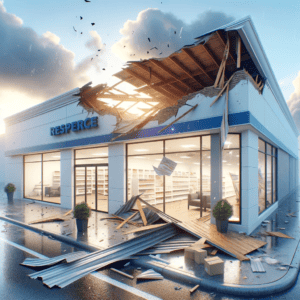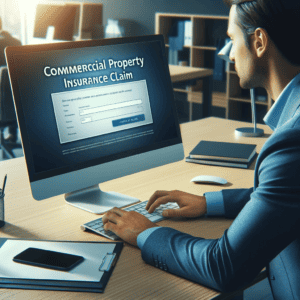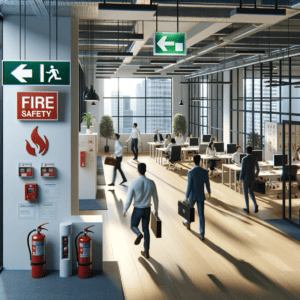
Commercial Property Insurance – A Comprehensive Guide
Commercial property insurance is a crucial aspect of protecting your business and its assets. Whether you own a small retail store or a large manufacturing facility, understanding the ins and outs of commercial property insurance is essential for safeguarding your investment.
This article will provide a comprehensive overview of commercial property insurance, including its definition, types of coverage, determining the right amount of coverage, factors affecting premiums, common exclusions and filing a claim.
Also get useful information choosing the right insurance provider, importance of regular inspections and maintenance, risk mitigation strategies, frequently asked questions, and the importance of reviewing your insurance coverage.
Key Takeaways
- Commercial property insurance provides coverage for physical damage or loss to a business’s property.
- There are different types of commercial property insurance coverage, including basic, broad, and special form policies.
- Property damage and losses covered by insurance can include fire, theft, vandalism, and natural disasters.
- To determine the right amount of coverage for your business, consider the value of your property and potential risks.
- Regular property inspections and maintenance can help mitigate risks and reduce insurance costs.
What is Commercial Property Insurance?
Commercial property insurance is a type of insurance coverage that protects businesses against property damage and losses. It provides financial compensation for repairs or replacement of damaged or destroyed property due to covered perils such as fire, theft, vandalism, or natural disasters. This insurance is not limited to just buildings; it also covers business personal property such as equipment, inventory, furniture, and fixtures.
Any business that owns or leases commercial property can benefit from commercial property insurance. This includes but is not limited to retail stores, restaurants, offices, warehouses, manufacturing facilities, and medical clinics. Even if you operate your business from home, you may still need commercial property insurance if you have valuable equipment or inventory.
Types of Commercial Property Insurance Coverage
- Building coverage: This type of coverage protects the physical structure of your building against perils such as fire, windstorm, or vandalism. It includes the cost of repairs or reconstruction in case of damage.
- Business personal property coverage: This coverage protects your business assets such as equipment, inventory, furniture, and fixtures. It compensates for the cost of repair or replacement in case of damage or loss.
- Business interruption coverage: Business interruption coverage provides financial compensation for lost income and ongoing expenses if your business operations are interrupted due to a covered peril. It helps you cover expenses such as rent, payroll, and utilities while your business is temporarily closed.
- Equipment breakdown coverage: This coverage protects your business against the cost of repairing or replacing equipment that breaks down due to mechanical or electrical failure. It can cover the cost of repairs, temporary replacement equipment, and lost income during the downtime.
- Crime coverage: Crime coverage protects your business against losses resulting from theft, burglary, employee dishonesty, or forgery. It can cover stolen cash, stolen inventory, and damage caused by theft or vandalism.
Understanding Property Damage and Losses Covered by Insurance
| Property Damage and Losses Covered by Insurance | Definition | Examples |
|---|---|---|
| Fire Damage | Damage caused by fire, smoke, and soot | Burned walls, ceilings, and floors |
| Water Damage | Damage caused by water from burst pipes, floods, and storms | Wet carpets, damaged drywall, and mold growth |
| Theft and Vandalism | Loss or damage caused by theft or intentional damage | Stolen electronics, broken windows, and graffiti |
| Natural Disasters | Damage caused by natural events such as hurricanes, tornadoes, and earthquakes | Collapsed roofs, fallen trees, and flooded homes |
| Liability | Legal responsibility for damage or injury caused to others | Medical bills and legal fees resulting from a slip and fall accident on your property |
Commercial property insurance covers a wide range of property damage and losses. Some examples of covered losses include fire damage, water damage from burst pipes, windstorm damage, theft or vandalism, damage caused by vehicles or aircraft, and damage from natural disasters such as earthquakes or floods.
However, it is important to note that commercial property insurance policies also have exclusions and limitations. These exclusions may include certain perils such as earthquakes or floods, intentional acts of damage by the insured or employees, wear and tear, or damage caused by war or terrorism. It is crucial to carefully review your policy to understand what is covered and what is not.
How to Determine the Right Amount of Coverage for Your Business
Determining the right amount of coverage for your business requires careful consideration of several factors. First, you need to calculate the value of your property, including buildings, equipment, inventory, and other assets. This can be done by conducting a thorough inventory and appraisal of your business assets.
Next, consider the potential risks your business faces. For example, if you operate in an area prone to natural disasters such as hurricanes or earthquakes, you may need higher coverage limits for those specific perils. Additionally, consider the potential cost of business interruption if your operations are temporarily halted due to a covered peril.
Working with an insurance agent who specializes in commercial property insurance can be immensely helpful in determining the right amount of coverage for your business. They can assess your specific needs, provide expert advice, and help you navigate through the complexities of insurance policies.
Factors Affecting Commercial Property Insurance Premiums

Commercial Property Insurance Premiums
Several factors can influence the cost of your commercial property insurance premiums. These factors include:
- Location of the business: The location of your business plays a significant role in determining your insurance premiums. If your business is located in an area prone to natural disasters or has a high crime rate, you may face higher premiums.
- Type of business: The nature of your business also affects your insurance premiums. For example, a manufacturing facility with hazardous materials will have higher premiums compared to a retail store.
- Age and condition of the property: Older buildings or properties in poor condition may have higher premiums due to increased risks of damage or loss.
- Deductible amount: The deductible is the amount you must pay out of pocket before your insurance coverage kicks in. Choosing a higher deductible can lower your premiums but also means you will have to pay more in case of a claim.
- Claims history: Your claims history can impact your insurance premiums. If you have a history of frequent claims or large losses, insurers may consider you a higher risk and charge higher premiums.
Common Exclusions in Commercial Property Insurance Policies
Commercial property insurance policies often have common exclusions that are important to be aware of. Some examples include:
- Earthquakes and floods: Most standard commercial property insurance policies do not cover damage caused by earthquakes or floods. Separate policies or endorsements may be required for coverage against these perils.
- Wear and tear: Normal wear and tear or gradual deterioration of property is typically not covered by commercial property insurance.
- Intentional acts: Damage caused intentionally by the insured or employees is generally excluded from coverage.
- War or terrorism: Damage caused by war, acts of terrorism, or civil unrest may be excluded from coverage.
It is crucial to carefully review your policy and discuss any exclusions with your insurance provider. In some cases, additional coverage or endorsements may be available to address specific exclusions.
How to File a Claim for Property Damage or Loss

How to File a Claim for Property Damage or Loss
In the unfortunate event of property damage or loss, it is important to know how to file a claim with your insurance provider. Here are the steps to take:
- Notify your insurance provider: Contact your insurance provider as soon as possible to report the damage or loss. Provide them with all the necessary details and documentation, including photos, videos, and any relevant police reports.
- Document the damage: Take detailed photographs or videos of the damaged property before making any repairs. This will serve as evidence for your claim.
- Mitigate further damage: Take immediate steps to prevent further damage, such as covering broken windows or leaking roofs. Keep all receipts for expenses related to temporary repairs.
- Provide documentation: Gather all relevant documentation, including receipts, invoices, and estimates for repairs or replacement of damaged property.
- Cooperate with the claims adjuster: Your insurance provider will assign a claims adjuster who will assess the damage and determine the amount of compensation you are entitled to. Cooperate fully with the adjuster and provide any additional information they may require.
- Review the settlement offer: Once the claims adjuster has completed their assessment, they will provide you with a settlement offer. Review it carefully and consult with your insurance agent if you have any questions or concerns.
- Negotiate if necessary: If you believe the settlement offer is insufficient, you can negotiate with your insurance provider to reach a fair resolution. Provide any additional evidence or documentation that supports your claim.
- Finalize the claim: Once you have reached an agreement with your insurance provider, finalize the claim by signing any necessary documents. Keep copies of all correspondence and documentation related to the claim.
Tips for Choosing the Right Insurance Provider for Your Business
Choosing the right insurance provider is crucial for ensuring you have the right coverage and excellent customer service. Here are some tips to consider when selecting an insurance provider for your business:
- Reputation and financial stability: Research the reputation and financial stability of potential insurance providers. Look for companies with a strong track record of customer satisfaction and financial strength.
- Specialization in commercial property insurance: Choose an insurance provider that specializes in commercial property insurance. They will have a better understanding of your specific needs and can provide tailored coverage options.
- Customer reviews and testimonials: Read customer reviews and testimonials to get an idea of the level of service provided by the insurance provider. Look for positive feedback regarding claims handling, responsiveness, and overall customer experience.
- Availability of coverage options: Ensure that the insurance provider offers a wide range of coverage options that can be customized to meet your specific needs. This includes coverage for unique risks associated with your industry or location.
- Competitive pricing: Obtain quotes from multiple insurance providers to compare pricing. However, keep in mind that price should not be the sole determining factor. Consider the overall value provided by the insurance company, including coverage options, customer service, and claims handling.
- Claims handling process: Research how the insurance provider handles claims. Look for a company that has a streamlined claims process and a reputation for fair and prompt settlements.
Importance of Regular Property Inspections and Maintenance
Regular property inspections and maintenance are essential for preventing potential risks and minimizing property damage. Here are some benefits of regular inspections and maintenance:
- Early detection of issues: Regular inspections allow you to identify potential issues before they become major problems. This can include identifying signs of water damage, electrical issues, or structural weaknesses.
- Preventive maintenance: Regular maintenance helps prevent equipment breakdowns and reduces the risk of property damage. This can include tasks such as cleaning gutters, servicing HVAC systems, or inspecting fire suppression systems.
- Compliance with safety regulations: Regular inspections ensure that your property meets safety regulations and building codes. This can help prevent accidents and potential liability issues.
Creating a maintenance plan is crucial for ensuring that inspections and maintenance tasks are carried out consistently. This plan should outline specific tasks, frequency of inspections, and responsible parties.
Regular property inspections and maintenance can also impact your insurance costs. Insurance providers may offer discounts or lower premiums to businesses that demonstrate proactive risk management practices.
How to Mitigate Risks and Reduce Insurance Costs

Fire Safety
Mitigating risks is an important aspect of reducing insurance costs and protecting your business. Here are some tips for mitigating risks:
- Implement safety protocols: Establish comprehensive safety protocols for your business, including fire safety measures, security systems, and employee training programs. This can help prevent accidents, theft, and property damage.
- Conduct regular employee training: Train your employees on safety procedures, emergency response protocols, and proper handling of equipment. Well-trained employees are more likely to identify potential risks and take appropriate action.
- Install security measures: Install security cameras, alarms, and access control systems to deter theft and vandalism. This can help reduce the risk of property damage and loss.
- Backup important data: Regularly backup important data and store it in a secure off-site location or in the cloud. This can help protect your business from data loss due to equipment failure or cyber-attacks.
- Maintain proper documentation: Keep detailed records of maintenance activities, inspections, and repairs. This documentation can be valuable in case of a claim or when negotiating insurance premiums.
Implementing risk mitigation strategies can not only reduce the likelihood of property damage but also lower your insurance costs. Insurance providers often offer discounts or lower premiums to businesses that demonstrate proactive risk management practices.
Frequently Asked Questions about Commercial Property Insurance
What is commercial property insurance?
Commercial property insurance is a type of insurance policy that provides coverage for physical assets and property owned by a business. It protects businesses from financial losses due to damage or loss of property caused by various perils such as fire, theft, vandalism, and natural disasters.
What does commercial property insurance cover?
Commercial property insurance covers physical assets and property owned by a business, including buildings, equipment, inventory, furniture, and fixtures. It also covers losses due to business interruption, extra expenses incurred during the interruption, and liability claims arising from property damage or bodily injury.
What are the types of commercial property insurance?
The types of commercial property insurance include basic form, broad form, special form, and all-risk form. Basic form covers only specific perils such as fire, lightning, and explosion. Broad form covers additional perils such as water damage, windstorm, and hail. Special form covers all perils except those specifically excluded in the policy. All-risk form covers all perils unless they are specifically excluded in the policy.
How is the premium for commercial property insurance calculated?
The premium for commercial property insurance is calculated based on various factors such as the type of business, location, size of the property, construction materials, age of the building, and the level of coverage required. The higher the risk of loss, the higher the premium.
What is business interruption coverage?
Business interruption coverage is a type of coverage that provides compensation for lost income and extra expenses incurred during a period of interruption caused by a covered peril such as fire, flood, or natural disaster. It helps businesses to recover from the financial losses due to the interruption.
What is the difference between commercial property insurance and general liability insurance?
Commercial property insurance covers physical damage to your property and assets, while general liability insurance covers third-party claims for bodily injury or property damage caused by your business operations.
Do I need commercial property insurance if I lease my business space?
Yes, even if you lease your business space, you should still consider commercial property insurance. While the building itself may be covered by the landlord’s insurance, you are responsible for insuring your business personal property and any improvements or alterations you have made to the space.
Can I add additional coverage to my commercial property insurance policy?
Yes, you can often add additional coverage options or endorsements to your commercial property insurance policy to address specific risks or exclusions. Discuss your needs with your insurance provider to determine the best options for your business.
How often should I review my commercial property insurance coverage?
It is recommended to review your commercial property insurance coverage annually or whenever there are significant changes to your business, such as acquiring new assets, expanding operations, or relocating.
What should I do if my business experiences a loss that is not covered by my commercial property insurance policy?
If you experience a loss that is not covered by your commercial property insurance policy, it is important to explore other options for financial assistance. This may include seeking government assistance programs, applying for loans, or exploring crowdfunding options.
Conclusion
Commercial property insurance is a vital component of protecting your business and its assets from potential risks and losses. Understanding the various aspects of commercial property insurance, including types of coverage, determining the right amount of coverage, factors affecting premiums, common exclusions, filing a claim, choosing the right insurance provider, regular inspections and maintenance, risk mitigation strategies, and frequently asked questions, is crucial for making informed decisions and ensuring adequate protection for your business.
Take the time to review your current insurance coverage and consult with an insurance professional to ensure that you have the right coverage in place. By doing so, you can have peace of mind knowing that your business is well-protected against potential property damage or losses.





